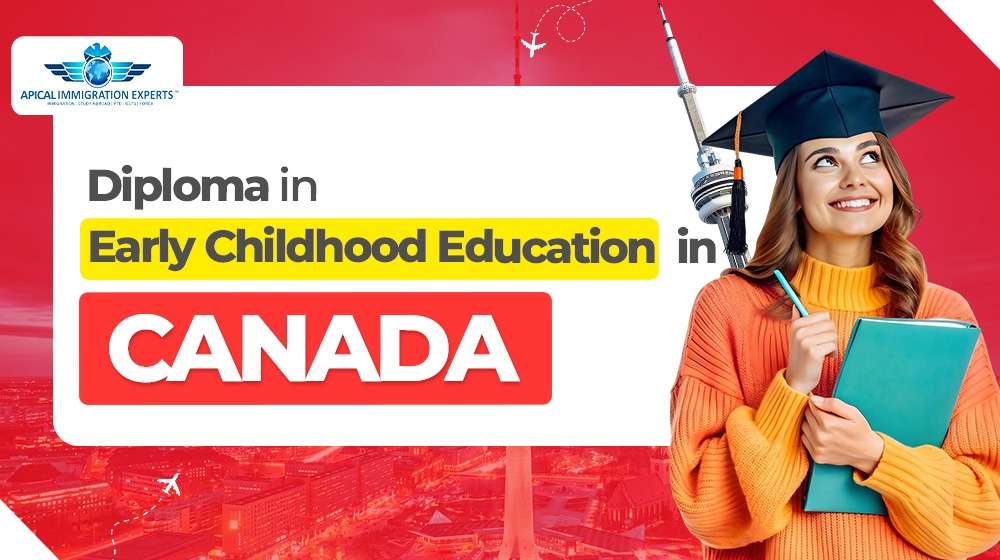The formative years of a child’s life play a vital role in shaping their skills, behavior, and overall development. Research indicates that nearly 90% of brain development happens before the age of five — highlighting the crucial role of early childhood educators. Students who wish to make a difference in young lives can consider pursuing a qualification in Early Childhood Education (ECE). Such programs focus on understanding child development and acquiring the skills needed to guide young learners in preschool, nursery, and other pre-primary settings.
Canada has emerged as a top destination for studying Early Childhood Education, thanks to its strong academic infrastructure and government support. The Canadian government is actively promoting this field, projecting over 100,000 new job openings across provinces by 2031. Among the various options available, a Diploma in Early Childhood Education—either undergraduate or postgraduate—is one of the most popular choices.
Early childhood educators play a key role in nurturing children’s social, emotional, cognitive, and motor skills. In this article, we’ll explore everything about pursuing a Diploma in Early Childhood Education in Canada, including eligibility, costs, and career paths.
Understanding Early Childhood Education and Care (ECEC) in Canada
A Diploma in Early Childhood Education in Canada equips students with the knowledge and skills to support children’s emotional, social, behavioral, and physical growth. This field falls under Early Childhood Education and Care (ECEC), which is divided into two major branches:
- Early Learning and Child Care (ELCC): Focuses on the education and care of children under six years old in informal environments such as preschools or daycare centers.
- Kindergarten: Involves more structured learning approaches for children before they enter primary school.
Both branches are governed by provincial and territorial (PT) regulations to ensure high-quality education and access to current teaching methodologies.
ECEC programs often include practical placements in childcare settings, providing students with hands-on experience. Many institutions also collaborate on research projects to shape policies for child development.
Types of Diploma Courses in Early Childhood Education
When pursuing a Diploma in Early Childhood Education, students can choose from a range of programs tailored to different interests such as special needs education or indigenous education. Common options include:
- Advanced Diploma in Early Childhood Education: A 3-year program available after high school or an undergraduate degree, often including internships or co-op placements.
- Undergraduate Diploma in Early Childhood Education: A 2-year course for high school graduates combining theoretical study and practical training.
The main differences between programs lie in their duration, curriculum, and institutional focus.
Must Read: What Are The Top-Paying Part-Time Jobs In The Canada?
Leading Institutions Offering Diplomas in Early Childhood Education in Canada
Canada hosts numerous reputed colleges offering research-based, affordable, and industry-relevant programs. Top institutions include:
- Humber Polytechnic
- Fanshawe College
- Fleming College
- Conestoga College
- George Brown College
- Seneca Polytechnic
- Durham College
- St. Lawrence College
- Cambrian College
- Southern Alberta Institute of Technology
- Manitoba Institute of Trades and Technology
- Suncrest College
Eligibility Requirements
Although eligibility varies by institution, most Canadian colleges require the following for admission:
Academic Qualifications: Completion of 12th grade (high school) with a minimum of 50% marks from a recognized board.
English Proficiency:
- IELTS: Minimum overall band score of 6.0
- TOEFL: Minimum score of 80
- PTE: Minimum score of 53
Some institutions may also assess relevant experience or conduct interviews during the selection process.
Post-Admission Requirements
After securing admission, students may need to provide:
- Updated vaccination and immunization records, along with a chest X-ray or TB test.
- A valid First Aid Certificate including CPR training.
These requirements typically apply once partial tuition fees are paid and before classes begin.
Cost of Studying a Diploma in Early Childhood Education in Canada
The annual tuition fee for an Undergraduate Diploma ranges between CAD 11,580 – CAD 18,740.
Additionally, the cost of living varies from CAD 1,165 – CAD 3,140 per month, depending on the city and lifestyle.
Creating a clear budget and exploring financial aid options is essential for international students planning to study in Canada.
Certifications for Early Childhood Education Professionals
Upon completing a Diploma, students can apply for certification as either:
- Early Childhood Educators (ECEs)
- Early Childhood Educator Assistants (ECEAs)
Both roles involve fostering children’s growth through engaging activities, but differ in responsibilities and qualification levels:
| Differentiating Factors | Early Childhood Educators (ECEs) | Early Childhood Educator Assistants (ECEAs) |
| Responsibilities | Design and implement programs that enhance children’s cognitive, emotional, and physical growth; organize activities like art, storytelling, and sports; collaborate with parents and policymakers. | Support ECEs in executing learning activities; assist children in daily routines; contribute to classroom management and teamwork. |
| Qualifications | Typically require a 2–4 year certificate or diploma and approval for an Early Childhood Educator Certificate. | Completion of a post-secondary program (e.g., Diploma in ECE) and accreditation by a PT association. |
After certification, professionals can work in any Canadian province or territory.
Career Opportunities after Diploma in Early Childhood Education
Graduates can pursue rewarding careers across a variety of sectors such as:
- Preschools
- Daycare centers
- Community organizations
- Hospitals
- Childcare centers
Common job titles include:
- Early Childhood Educator
- Early Childhood Educator Assistant
- Special Needs Educator
- Kindergarten Teacher
With ongoing labor shortages projected until 2033, Canada continues to offer excellent opportunities for qualified educators.
FAQs: Diploma in Early Childhood Education in Canada
- What are the intakes for a Diploma in Early Childhood Education in Canada?
Most institutions offer intakes in January, May, and September, though exact dates vary. - Are scholarships available?
Yes. Many colleges and the Canadian government provide merit- or need-based scholarships for international students — such as the Humber Polytechnic International Entrance Scholarship. - Can international students work part-time?
Yes, up to 24 hours per week off-campus during the semester. - Is a Post-Study Work Visa applicable for Diploma students?
Yes. Graduates from institutions listed under the Designated Learning Institutions (DLI) can stay and work in Canada for up to 3 years after completing a 2- or 3-year diploma. - What is the average salary in this field?
Graduates typically earn between CAD 34,000 – CAD 73,000 per year (approx. ₹21–45 lakh INR annually), depending on their role and province.
Begin your journey toward shaping young minds — apply for a Diploma in Early Childhood Education in Canada today! Schedule a Free Counselling Session Today!
- Email: info@immigrationxperts.com
- Call us: +91-9999467686, +91-8447-696555






